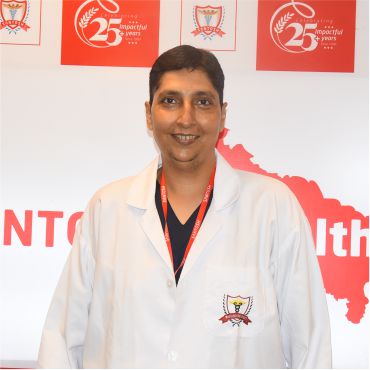Institute of ENT
Institute of ENT
The Institute of Otorhinolaryngology (ENT) at Santosh Hospital provides comprehensive care for patients of all ages with disorders related to the ear, nose, sinus, head, and neck region. With a team of skilled consultants, specialists, and support staff, we offer customized treatment plans, including both surgical and non-surgical approaches, based on extensive evaluation and evidence-based practices. Our institute caters to a wide range of ENT needs, from common conditions that can be managed in a doctor's office to complex issues that may require advanced surgical interventions.
Our department has made significant advancements in otology, rhinology, laryngology, and head and neck surgery. We house specialized clinics such as the Hard of Hearing Clinic, Headache Clinic, Allergy Clinic, Voice Lab, and Auditory Rehabilitation Center, where we conduct various procedures like nasal endoscopy, otoendoscopy, and video laryngoscopy on an outpatient basis.
The areas of expertise in the field of ENT at Santosh Hospital include:
- Allergy:
- Head and Neck
- Laryngology
- Neurotology
- Facial Plastic and Reconstructive Surgery
At the Institute of Otorhinolaryngology at Santosh Hospital, our focus is on delivering comprehensive and patient-centered care. Our experienced team of ENT specialists and support staff are committed to providing personalized treatment plans, utilizing the latest advancements in medical technology and techniques. We aim to improve the overall quality of life for our patients by addressing their ENT needs with expertise and compassion.

Our Doctors
Meet the team of experts

Associate Professor

Assistant Professor

Assistant Professor

Professor
FAQs
Clearing your doubts
If you have a persistent sore throat, it's advisable to consult an ENT specialist. They can examine your throat, assess your symptoms, and determine the underlying cause. Causes of a persistent sore throat may include infections, tonsillitis, acid reflux, or other conditions. The ENT specialist will provide an accurate diagnosis and recommend appropriate treatment
options.
To help prevent ear infections, it's important to maintain good ear hygiene. Avoid inserting objects into your ears, such as cotton swabs, as they can damage the delicate ear canal and increase the risk of infection. Additionally, avoid exposure to secondhand smoke, practice good hand hygiene, and manage allergies effectively as they can contribute to ear infections.if you or your child are prone to recurrent ear infections, consult an ENT specialist for further evaluation and personalized preventive measures.
It's advisable to seek medical attention if you experience sudden hearing loss, as prompt evaluation and treatment may improve outcomes. Additionally, if you notice a gradual or persistent decline in your hearing ability, consulting an ENT specialist is recommended. They can assess your hearing loss, identify potential causes, and recommend appropriate interventions, such as hearing aids or other treatments.
Managing allergies that affect the sinuses involves several approaches. Identifying and avoiding allergens that trigger your symptoms is essential. This may include reducing exposure to pollen, dust mites, pet dander, or certain foods. Over-the-counter antihistamines or nasal saline irrigation can provide relief for mild symptoms. However, if your allergies significantly impact your quality of life, an ENT specialist can evaluate your condition, provide a comprehensive treatment plan, and potentially prescribe medications or recommend allergy immunotherapy.


.png)






